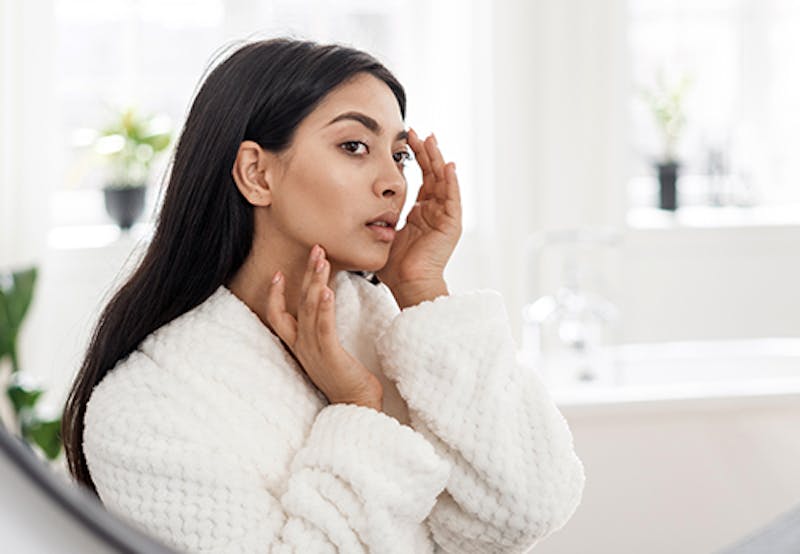
Acne is never fun. To add insult to injury, these blemishes can also have lasting effects, even long after the bumps themselves are gone. Dermatologists call these marks acne scars or hyperpigmentation, depending on the type of spot. And while every iteration requires a specific treatment, with the right game plan, scar reduction (and even removal) is possible. To better understand what acne scars are and the best ways to treat them, we asked Dr. Dendy Engelman, a board-certified cosmetic dermatologist and Moh’s surgeon at the Shafer Clinic, for her best tips.
Why We Scar
Acne scars are visible marks made by a pimple or cyst. According to Dr. Engelman, there are two types: texture scars and dark marks. The former involve a change in skin texture, which can result in depressed or raised ridges. The latter, on the other hand, are not “true scars”—in fact, they are actually post-inflammatory hyperpigmentation caused by cystic acne and, in certain cases, minor blemishes. Anyone can experience acne scars, but those with darker skin tones are oftentimes more prone to hyperpigmentation, notes Dr. Engelman; genetics can also make someone predisposed to acne and residual scarring.
Treating Dark Marks
If you are hoping to reduce the appearance of dark marks, Dr. Engelman suggests using products with salicylic or glycolic acid to aid with cell turnover; this will remove that darkened top layer. She also recommends using brightening ingredients, like vitamin C, kojic acid, and hydroquinone, which have lightening properties. Her favorite formulas include Skinceuticals CE Ferulic ($166, dermstore.com) and Elizabeth Arden Vitamin C Ceramide Capsules ($87, macys.com). “Both are great as they noticeably reduce dark spots by inhibiting melanin production through the tyrosinase pathway. They also improve skin’s appearance, with the added bonus of minimizing fine lines and wrinkles,” she notes.
Exfoliating products will likely have the agents you need to lessen these marks; Dr. Engelman likes Glo Skin Beauty’s Hydra-Bright Pro 5 Liquid Exfoliant ($56, dermstore.com) which is gentle and clinically proven to brighten and even tone thanks to its blend of alpha hydroxy (mandelic, lactic, malic, and tartaric) and polyhydroxy acids. She also suggests the brand’s Hydra-Bright Alpha Arbutin Drops ($54, dermstore.com); they have glycolic and azelaic acids along with alpha-arbutin to brighten and even your complexion. “This is a gentle formula that is great for all skin tones,” she adds.
As for some other treatments to consider when trying to fade dark marks? LED light and laser therapy are popular options. Be careful, however, if you do decide to go under the laser, especially if you have a deeper skin tone. According to Dr. Engelman, lasers are easily absorbed by melanin and can damage the complexion, causing the dermis to either lose pigment or become more hyperpigmented. To prevent this, be sure to do your research and visit a trained professional with the right credentials; they should also have experience working on melanin-rich skin.
Treating Texture Scars
Because texture scars involve resurfacing the skin and promoting cell turnover, Dr. Engelman notes that effective options include microneedling, using a dermaroller, and doing deep chemical peels. “These help build collagen from the inside out, and collagen helps to fill the scars from within,” she says. If you’re looking for a topical treatment for those texture scars, she says silicone-based products have the most scientific data to prove their effectiveness; retinol can also help tighten the visage and lessen the appearance of scarring.
She recommends looking for products that contain an epidermal growth factor (EGF), a protein that stimulates wound healing. “When applied topically, EGF triggers your cell’s receptors to produce more collagen (a function that naturally declines as we age, starting in our 20s) which helps fill in texture scars, making them disappear from the inside out,” she says. “It also strengthens the barrier and thickens skin, resulting in an overall healthier, better-looking complexion.” She likes Glo Skin Beauty’s Bio-Renew EGF Drops ($125, dermstore.com) which employs 100-percent vegan EGF to repair scars and even out tone and texture.
And though most experts will always suggest doing more intensive treatments with a trained dermatologist, if you want to try microneedling at home, use the Environ Cosmetic Gold Roll-CIT ($548.50, amazon.com), says Dr. Engelman. The device’s needles create micro wounds to trigger controlled skin injury and healing. But the most important piece of advice she can give when dealing with both types of acne scars is to never pick them. “You can actually give yourself new scars or worsen existing blemishes by picking at your skin,” she concludes.


